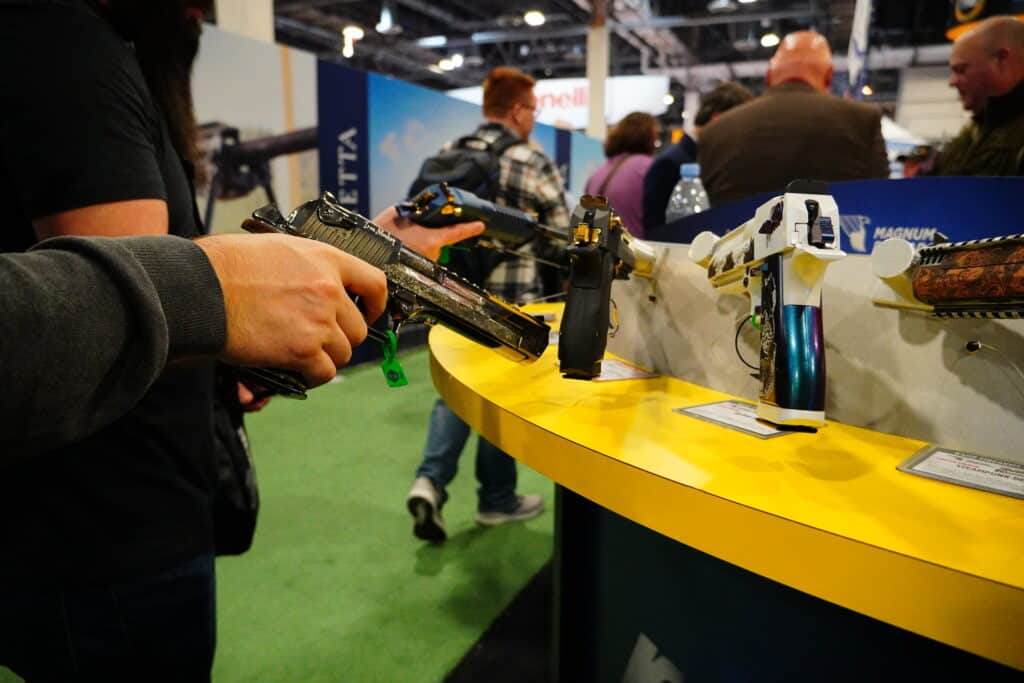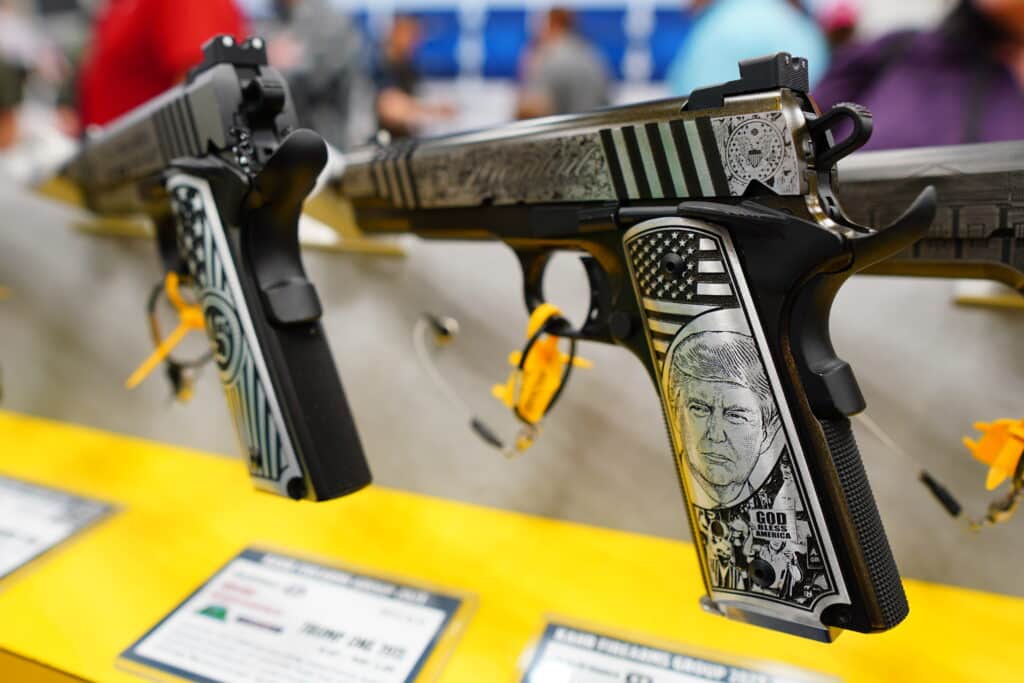For the first time since Bruen, a federal judge has tossed out a waiting period law on Second Amendment grounds. Plaintiffs overcame what I’ve described as the “one weird trick” argument for upholding gun sales restrictions. Contributing Writer Jake Fogleman breaks down the latest ruling.
Then, I take a look at why the Trump Administration’s freeze on export licensing will hit gun exporters particularly hard. Plus, Duke’s Andrew Willinger joins the podcast to give his take on how Trump’s DOJ might approach gun litigation.
Also, ABC News is reporting their sources indicate Kash Patal is going to be appointed as the acting director of the ATF in addition to his role as FBI director next week. There hasn’t been any confirmation from the Trump Administration yet, but we will keep on top of it.

Analysis: Federal Judge Delivers First 2A Win on Waiting Periods By Dismissing ‘One Weird Trick’ Argument [Member Exclusive]
By Jake Fogleman
Gun-rights advocates found success against waiting periods by convincing a federal judge to buck a trend that has been used to short-circuit the Supreme Court’s Second Amendment test.
US District Court Judge Lance Walker issued a preliminary injunction last week against Maine’s 72-hour waiting period for all gun sales. He determed that a blanket delay on the purchase of firearms likely violates the Second Amendment because no Founding-era analogue for the practice exists.
En route to reaching that decision, Walker first established the Second Amendment includes a right to acquire firearms. While that might seem obvious to the average person with even a cursory familiarity with the amendment’s text, it has proved surprisingly controversial among federal judges.
In fact, between the Bruen decision being handed down in June of 2022 and this month’s Maine ruling, not one federal judge had either blocked or struck down a waiting period. Yet, several have upheld them and similar commercial restrictions under the same literalist reading of the right to “keep” and “bear” arms that would exclude the actions required to obtain them. Under this line of thought, no historical analysis is required, and a given gun law is presumptively constitutional.
This “one weird trick” reading of the Second Amendment first reared its head in the context of waiting periods back in November 2023. At the time, US District Judge John Kane declined to issue a preliminary injunction against Colorado’s three-day waiting period law because he said the commercial purchase of a firearm does not implicate the right to keep and bear arms.
“After examining the language of the Second Amendment using the Supreme Court’s analysis in Heller, I find, for the purposes of Plaintiffs’ Motion, that the plain text does not cover the waiting period required by the Act,” Kane wrote in RMGO v. Polis.
“From this reading of the plain text, it is clear the relevant conduct impacted by the waiting period—the receipt of a paid-for firearm without delay—is not covered,” he added. “Still, Plaintiffs attempt to equate the words ‘obtain’ and ‘possess.’ But these terms are not equivalent.”
It again appeared multiple times last July as gun-rights groups sought to block Vermont and New Mexico’s three-day and seven-day waiting periods, respectively.
“The Court concludes that the ‘right of the people to keep and bear Arms’ does not facially include a right to immediately obtain a firearm through a commercial sale,” Judge William K. Sessions wrote in Vermont Federation of Sportsmen’s Clubs et al v. Birmingham et al. “The Court finds that the relevant conduct – acquiring a firearm through a commercial transaction on-demand – is not covered by the plain text of the Second Amendment. Plaintiffs may keep and bear arms without immediately acquiring them.”
“Today and in 1791, the normal and ordinary meaning of ‘keep’ is to possess and the normal and ordinary meaning of ‘bear’ is to carry,” Judge James O. Browning wrote in Ortega v. Lujan Grisham. “In concrete terms, the Waiting Period Act does not limit an individual’s ability to keep firearms in their home nor carry those firearms with them in public for self-defense.”
“Because the Second Amendment’s plain text does not cover the conduct that the Waiting Period Act implicates — purchasing a firearm — and because the Waiting Period Act’s burden on acquiring a firearm is not so onerous as to implicate rights the Second Amendment’s plain text does cover — i.e., possessing and carrying firearms — the Waiting Period Act is not presumptively unconstitutional at Bruen’s first step,” he concluded.
In this month’s Maine case, the state’s attorney general, Aaron Frey (D.), invoked those findings in defense of his state’s waiting period. He similarly claimed that the Second Amendment only protects the right to keep and bear arms already possessed and does not cover a right to acquire new ones. Unlike his predecessors in those other states, however, Judge Walker rejected that argument head-on, calling it “a curious construction indeed.”
“It is an interpretation that is not only unsupported by the text of the Constitution but one that makes the core right to keep and bear arms illusory if it is relegated to those arms in circulation at the time of the founding or through sales not subject to a background check,” he wrote in Beckwith v. Frey. “If a citizen cannot take possession of a firearm then his or her right to possess a firearm or to carry it away is indeed curtailed, even if, as Frey claims, the curtailment is modest.”
He even took direct aim at several of those prior rulings, sardonically referring to them as “a surprise revival of the textualist judicial tradition from some rather unexpected quarters.”
“They are unpersuasive insofar as they express the very same tell of overly qualified reasoning in service of something other than giving ordinary effect to the plain words of the Second Amendment,” Walker wrote.
Once past the textual bar that halted the previous waiting period challenges, Walker was able to subject Maine’s law to a historical inquiry in search of analogous regulations. As even the attorney general conceded, there were virtually no similar Founding or Reconstruction-era sales restrictions. Therefore, Walker opted to block the law.
As it stands, the ruling gives gun-rights advocates their first federal post-Bruen win against waiting periods decided on Second Amendment grounds. It will almost certainly be cited as they continue to litigate against the dozen or so other states that also have waiting periods of varying lengths.
Unfortunately for them, their reprieve could wind up being relatively short. Maine’s attorney general has already filed an appeal of the decision to the First Circuit Court of Appeals. That circuit has proven to be a highly unfriendly venue for gun-rights advocates, and it could end up issuing a new decision much more in line with the other courts that have upheld waiting period laws.
That’s proven out even in friendlier circuit courts. The Fifth Circuit Court of Appeals, widely considered the most conservative and Second Amendment-friendly appellate court in the country, nevertheless endorsed the logic of the trick on a related issue. In an April 2024 decision, a three-judge panel comprised of two Republican-appointed judges upheld the “enhanced” background check provisions of the 2022 Bipartisan Safer Communities Act and the de facto 10-day waiting periods they create for 18-20-year-old gun buyers.
“The [Second Amendment’s] plain text covers plaintiffs’ right ‘to keep and bear arms,’” Judge Jerry E. Smith wrote in McRorey v. Garland. “And on its face ‘keep and bear’ does not include purchase—let alone without background check. That is so in either the contemporary or the Founding-era context.”
However, if and until the First Circuit follows suit, gun-rights advocates will at least have one concrete example to point to for what it looks like to overcome the “one weird trick” for gun sales restrictions.
Podcast: Duke’s Andrew Willinger on How Trump May Change DOJ’s Gun Litigation Approach [Member Early Access]
By Stephen Gutowski
This week, we’re taking a closer look at how the Trump DOJ might change its approach to gun litigation.
We’ve got Andrew Willinger of Duke University’s Firearms Law Center on the show to give us a different perspective from the one we got last week. He argued the administration is likely to move to reverse a lot of the Biden-era ATF rules currently tied up in court. Although, he said it might not do anything on the “ghost gun” rule currently waiting on a Supreme Court decision.
He argued areas where President Trump’s other commitments conflict with gun-rights priorities, the latter may take a back seat. He said Trump may prioritize going after gang members who use homemade guns over protecting collectors who like to build their own firearms. Similarly, while his own non-violent felony convictions may inform the DOJ’s approach to Second Amendment challenges against the lifetime ban for those offenses, his hardline rhetorical approach to drug crimes may lead the DOJ to argue in favor of that gun prohibition.
You can listen to the show on your favorite podcasting app or by clicking here. Video of the episode is available on our YouTube channel. An auto-generated transcript is here. Reload Members get access on Sunday, as always. Everyone else can listen on Monday.
Get a 30-day free trial for a subscription to The Dispatch by clicking here.
Plus, Contributing Writer Jake Fogleman and I cover the Trump administration’s current freeze on processing new export licenses and how it is hitting the firearms industry particularly hard. We also talk about a federal judge issuing a preliminary injunction against Maine’s 72-hour waiting period for gun sales, an Arizona state judge tossing a local gun control ordinance under preemption, and we wrap up with some headlines from outside The Reload.

Analysis: Trump Freeze Likely to Hit Gun Exporters Particularly Hard [Member Exclusive]
By Stephen Gutowski
President Donald Trump’s administration has put a blanket pause on most exports, but firearms companies are probably going to suffer more than others.
Starting February 5th, the Department of Commerce’s Bureau of Industry and Security (BIS) stopped processing new export licenses. That impacts all gun exports to all countries. BIS gave no warning that the pause would happen and has offered no explanation or justification for it.
The freeze comes just months after the end of a previous pause implemented by former President Joe Biden in the last year of his term.
Now, this appears to be another example of the Trump Administration not prioritizing the desires of gun-rights advocates rather than an actively hostile move intended to hurt the gun industry. The export license freeze doesn’t just apply to guns but a wide swath of other commercial products. It appears to be driven by the administration’s broader trade policy goals–specifically, an effort to ensure other countries aren’t using unspecified loopholes to bring in American products Trump and his advisors don’t want them to have.
So, Trump isn’t necessarily doing this because he dislikes or distrusts the gun industry–as was often the case with Joe Biden. Instead, it’s more that he prioritizes other interests above them, and he doesn’t appear to be overly concerned if the fallout from actions taken to forward those interests lands on the gun industry.
Of course, the intentions of the Trump Administration will likely bring little comfort for firearms exporters impacted by the freeze. It has only been a few months since the Biden Administration lifted its pause on some gun exports to certain countries amidst a tightening of export rules. Now, those exporters are having their businesses thrown back into limbo, but to an even greater extent.
“The current ‘pause’ is for ALL export licenses. It goes beyond the 90-day pause. Now, this current pause is to ALL countries, NATO, Wassenaar, etc,” Larry Keane, general counsel for the National Shooting Sports Foundation (NSSF), told The Reload. “It is worse.”
It’s unclear exactly what the state of the export licensing freeze is at the moment. Johanna Reeves, an export lawyer with lengthy experience, said BIS may have rolled back restrictions on some countries. However, NSSF said it’s still in full effect as far as the industry group is aware.
“I have not seen anything in writing, and nobody else has either because there’s no publication,” Reeves told The Reload. “It’s all been word of mouth.”
Either way, it likely remains much broader than the Biden pause. That action, which was supposed to last 90 days but dragged on longer than that, only applied to certain kinds of guns–like AR-15s–exported to certain countries. The Biden Administration lifted it after finalizing new permanent rules for those kinds of transactions.
This action, even if BIS has winnowed it down to only apply to certain countries, still applies to all guns being sent out. And there’s no clear end in sight, especially since nobody is sure why the pause is even happening this time around.
That’s really bad news for any business hoping to figure out how to weather this particular storm.
“You don’t have a sale without a license,” Jordan Young, owner of Global Defense, told The Reload back during the Biden pause. “You can have the money, you can have the guns, you can have everything in place. But, if you don’t have a license, you don’t have a sale.”
He argued pausing licensing back then was unnecessary–an argument that remains relevant today.
“We vet everyone before we even take a license to the Commerce Department. It’s not like I deal with everyone off the street,” Young said in 2024. “Our guns are going to licensed importers and distributors in those countries. They have to have licensing, and they have to follow the rules of their country.”
This all comes as gun-rights activists had been celebrating the potential of Trump’s executive order creating a review of executive branch gun policy. While he didn’t fulfill his promise to roll back Biden’s numerous gun actions within his first week in office, and he’s moved at a slower pace on guns than most other issues, his order did highlight most of the key areas gun-right activists have wanted work on. The administration hasn’t taken any significant action yet, but the order will likely lead to at least some developments that make gun owners happy.
The undoing of Biden’s federal rules is one of the prime opportunities for reform. That includes the pistol-brace ban and the ghost-gun ban. But it also includes those export rules Biden implemented last year. In fact, Reeves said there are rumors that’s exactly what will happen at the end of the day.
“Word has come down that everything that Commerce put in place regarding firearms and ammunition is going to be reversed,” she said. “This is only word of mouth. So, I haven’t seen anything.”
Gun rights don’t need to be a top priority of the Trump Administration for it to do things gun-rights advocates approve of. By virtue of pulling staff from the more pro-gun of the two parties alone, this administration is much more likely to install pro-gun officials and make pro-gun reforms. So, it’s possible this action is just a temporary setback on the way to a more permanent situation gun exporters will like.
However, it’s impossible to say for sure. What we know right now is that BIS isn’t issuing gun export licenses, and there’s no way to know when they might get going again. For businesses hit with multiple work stoppages in the past year alone and the long-term uncertainty that brings, it is very bad news that only worsens the longer the situation drags on.
That’s it for now.
I’ll talk to you all again soon.
Go Birds,
Stephen Gutowski
Founder
The Reload







